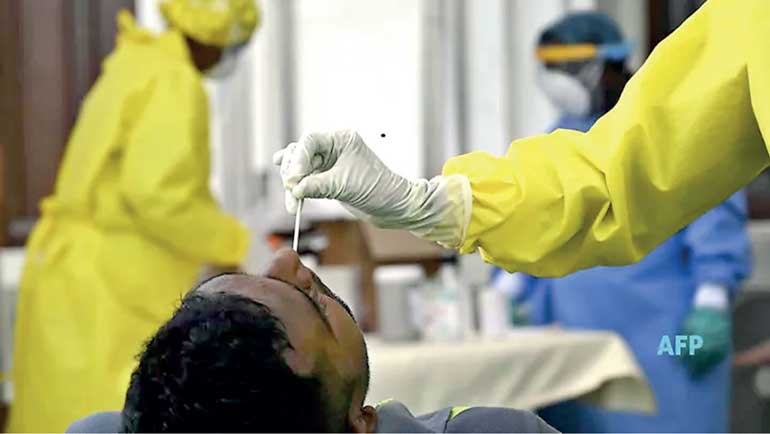Wednesday Feb 25, 2026
Wednesday Feb 25, 2026
Wednesday, 5 January 2022 00:00 - - {{hitsCtrl.values.hits}}

NEW DELHI (The Economic Times): Now into the third year of the COVID-19 pandemic, the WHO Southeast Asian region enhancing the capacity of its laboratories to test for SARS-CoV2 continues to be one of the key focus areas. The rapid detection of Omicron by countries in the region, within a week of its announcement as a variant of concern, is a testimony to the enhanced capacities of laboratories where molecular testing and genomic sequencing was limited at the start of the pandemic.
Through training laboratory workforce, procuring laboratory equipment, diagnostics, reagents, strengthening data management systems, sample transportation, etc., WHO, along with partners, has worked with member countries in the region to set up, expand and enhance testing capacities up to the sub-national levels to ensure testing is accessible to everyone, everywhere.
As a result, the number of laboratories testing for SARS-CoV2 has grown from five at the start of the pandemic to now over 48,000.
As of today, eight of the 11 countries in the region have laboratories conducting genome sequencing, while two more countries are in the process for setting up in-country genome sequencing capacities even as all countries have external access to such facilities.
Focus on testing
“Diagnostic services are critical for public health. During an outbreak timely information is needed to guide and tailor public health response to stop/curtail disease spread. Hence, since the onset of the COVID-19 outbreak, one of the key areas of WHO’s support has been to strengthen laboratory capacities, with the focus on addressing inequalities in access to COVID-19 diagnostics tools,” said WHO Southeast Asia Region Regional Director Dr. Poonam Khetrapal Singh.
In addition to strengthening capacities of national laboratory networks, WHO supported the expansion of testing capacities to subnational levels, to increase access to testing at the community level across the region. This was achieved with cross-sector collaboration involving academia, animal sector and private sector, as well as integrating existing laboratory networks and infrastructure. Partnerships either through local, regional or international expertise enabled rapid workforce deployment, technology transfer and stronger coordination and collaboration to respond to increasing testing demands as countries experienced a surge in cases of COVID-19.
New diagnostic tools were rapidly integrated into national testing strategies with 10 countries now implementing rapid antigen tests.
Ensuring quality
In the backdrop of a rapid expansion of laboratories and testing has been the focus on ensuring quality. WHO organised an external quality assurance program for detection of SARS-CoV-2 for national and sub-national laboratories during 2020 and early 2021. All countries with reported SARS-CoV-2 cases participated. The exercise was critical in identifying challenges for addressing and further strengthening national laboratory responses.
Ensuring a safe environment for laboratory personnel has always been critical, and more so during the pandemic. Recognising its importance, the WHO has been organising periodic and need based trainings and technical assistance in countries, beginning with the first regional webinar on biosafety considerations for SARS-CoV-2 as early as January 2020.
Strengthening lab networks and genome sequencing capacity
The WHO also supported countries in implementing dynamic testing strategies in view of the emergence of SARS-CoV-2 variants. Over time, genome sequencing capacity was strengthened across the region. As a result, eight countries have in-country capacity to carry out genomic sequencing, while the others have external access to such facilities. Two countries are in the process of building sequencing capacity. Thailand has been conducting genetic sequencing for specimens from Maldives and Myanmar.
The WHO is proposing setting up a SARS-CoV-2 genomics consortium in Southeast Asia this year. The consortium will help enhance genomic sequencing and surveillance to develop a robust regional system to detect and monitor the evolution of SARS-CoV-2 viral threats for epidemics and pandemics. This will also help improve the timely use of genomic data for public health decision-making and to strengthen preparedness and response to future outbreaks/pandemics.
Challenges still aplenty
However, challenges remain. Limited trained workforce and other resources are key barriers identified by countries for sustained long-term testing and sequencing capacities. In a bid to address this, the WHO is building a community of practice – sharing of experiences through webinars and sharing of information through platforms such as the regional laboratory network.
“With COVID-19 cases once again beginning to increase, amid emergence of a new variant in Omicron, we need to remain vigilant. Which means enhancing our capacities to quickly test and provide timey results, and conducting genome sequencing for the new variants,” the Regional Director said.
Though the focus currently is on enhancing testing and sequencing, the WHO aims to also bring in a more systematic approach for sustained testing and genomic surveillance for rapid detection and characterisation of emerging and re-emerging high threat pathogens.